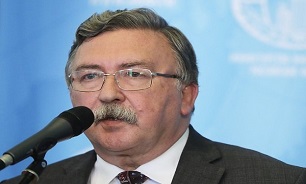Russia calls for respecting JCPOA regardless of illegal pressures
 This principle should be respected regardless of pressure that lacks a legal basis, Russia’s Permanent Representative to the Vienna-based international organizations Mikhail Ulyanov said on Tuesday at a meeting of the International Atomic Energy Agency (IAEA) Board of Governors in Vienna.
This principle should be respected regardless of pressure that lacks a legal basis, Russia’s Permanent Representative to the Vienna-based international organizations Mikhail Ulyanov said on Tuesday at a meeting of the International Atomic Energy Agency (IAEA) Board of Governors in Vienna.
"We are confident that the JCPOA is strong enough and the remaining members are capable of overcoming the difficulties that have emerged," he added.
“The need to restore the balance of interests enshrined in the JCPOA is obvious. Russia will continue to work together with its JCPOA partners and other interested countries," Ulyanov added.
"We call on all countries committed to the UN Charter to bear in mind that, according to Resolution 2231, the JCPOA is aimed at boosting economic and trade ties and cooperation with Iran," the Russian envoy pointed out.
In 2015, Iran and six other countries (five member states of the United Nations Security Council - Russia, the United States, France, the United Kingdom and China - and Germany) agreed on the final Joint Comprehensive Plan of Action (JCPOA), which particularly stipulated the removal of sanctions imposed on Tehran over its nuclear program.
On May 8, 2018, US President Donald Trump announced Washington’s withdrawal from the Iran nuclear deal. He said that old sanctions on Iran would be restored and new ones would be introduced in case Tehran attempted to pursue its nuclear goals. The first batch of new US sanctions on Iran took effect on August 7 and the second one became effective on November 5.
Iran says it will continue to remain in the JCPOA as long as its economic interests are met. EU has promised that its trade mechansim for Iran, called INSTEX, would faciliate trade with Tehran in the face of US sanctions.
Message end/
